The increasing need for an extensive social safety net has prompted most countries to launch new social protection measures or reframe existing ones. The G20’s Development Working Group emphasises the importance of effective social protection systems in achieving the Sustainable Development Goals (SDG) to enable the poor to contribute to mainstream economic activity. Taking a cue from this and learning lessons from the COVID-19 pandemic and recent developments in social protection, this policy brief examines whether existing social protection policies should be rethought and redesigned to respond to the challenges of the contemporary ‘polycrisis’ world, while also striving for more cost-effective and impactful approaches. The brief suggests a greater role for the G20 in supporting an enhanced global social protection agenda, ensuring coordination among its members in promoting these approaches, and mobilising resources, including through the expansion of development cooperation support to other non-G20 countries to expand and sustain robust national social protection initiatives as part of the overall SDGs implementation efforts.
Towards a Robust Social Protection System in the Post-Pandemic Era
Sayantan Ghosal (Research and Information System for Developing
Countries), Laura Trajber Waisbich (South-South Cooperation Research and
Policy Centre (Articulação SUL)/University of Oxford)
This Policy Brief was first published in https://t20ind.org
Abstract
Authors
Sayantan Ghosal (Research and Information System for Developing
Countries), Laura Trajber Waisbich (South-South Cooperation Research and
Policy Centre (Articulação SUL)/University of Oxford)
Latest Policy Briefs
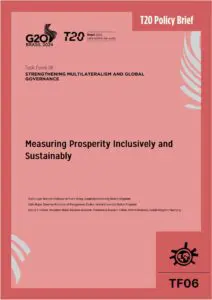
This Policy Brief advocates a thorough shift for the G20 from reliance on GDP as an economic yardstick of national performance and conventional measures of corporate profits as a ...
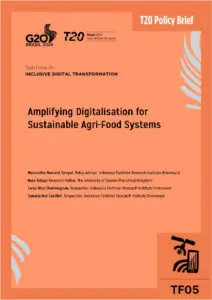
Ensuring food security emerges as a critical global imperative, particularly in the present and future uncertain geopolitical and economic circumstances. The contemporary agri-food systems heavily depend on international trade, ...
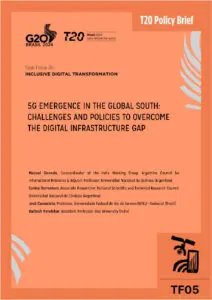
5G Emergence In The Global South: Challenges And Policies To Overcome The Digital Infrastructure Gap
Since 2016 G20 has focused on digital connectivity as an economic prosperity driver and the overcoming of multiple social inequalities. Currently, 5G is playing a prominent role in foreign ...
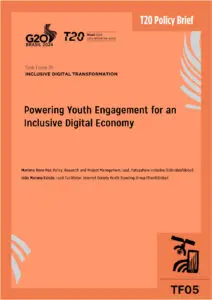
This policy brief advocates for youth meaningful engagement in digital economy policy and leverages youth’s perspectives on how to ensure that new digital technologies advance the Sustainable Development Goals ...
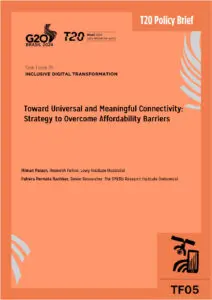
The challenge of digital affordability persists, with approximately 2.6 billion people, one-third of the global population, still lacking connectivity. While smartphones and broadband access are becoming more affordable in ...
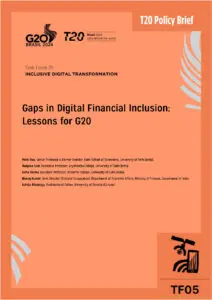
This policy brief aims to construct and analyze indices for access and usage dimensions of digital financial inclusion (DFI) in G20 economies, incorporating demographic characteristics such as gender, age, ...



